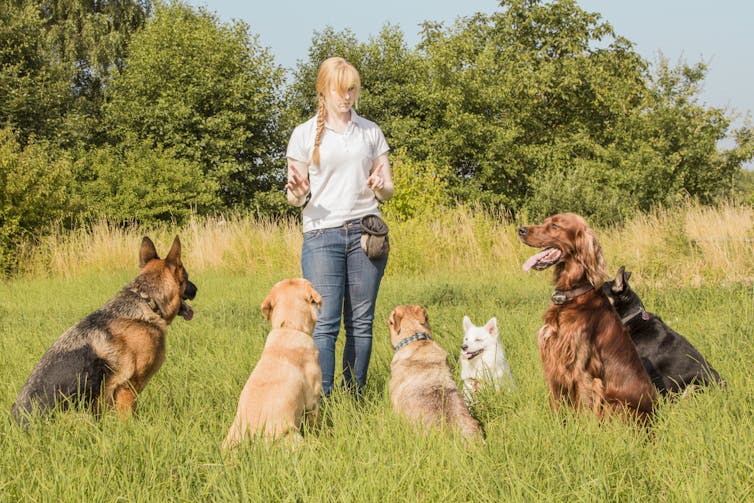Yes, your dog can understand what you’re saying — to a point
As expats interested in culture and language learning, we thought this would be fun reading for the weekend. Sophie Jacques, Associate Professor, Psychology and Neuroscience, at Dalhousie University explains how language acquisition for humans dogs have parallels in perceiving, learning and responding to specific words. Although canine behavior and language studies may be a new field, the results and observations give insight into ‘man’s best friend’.
Living in Italy with your pet?
Pet Shop Store is the online store for all your dog and cat needs. Food, toys, hygiene and accessories. There is a 5% off “Welcome Discount” for new customers and free shipping for orders over €38. Products are shipped from Rome and the friendly staff is ready to help with any inquiries. Shop now.
Language and communication
Humans are unique in their ability to develop sophisticated language abilities. Language allows us to communicate with each other and live in complex societies. It is key to our advanced cognitive abilities and technological prowess.
As a developmental psychologist, I have extensively studied the role of language in children’s cognitive development, especially their executive functions – the cognitive skills that allow them to control their behaviour, plan for the future, solve difficult problems and resist temptation.
Executive functions
The development of executive functions occurs slowly over the course of childhood. As they get older, children get better at organizing their thoughts and controlling their behaviours and emotions. In fact, humans are the only known species to develop advanced executive functions, although other species like birds, primates and dogs have rudimentary executive functions similar to young children.
In humans, our ability to develop executive functions has been linked to our language development. Language permits us to form and hold representations of our goals and plans in mind, allowing us to govern our behaviour over the long term.
What is not clear is whether language actually causes the emergence of executive functions, and whether the relation between language and executive functions exists only in humans.
Canine behaviour
For humans, studying dogs offers the perfect opportunity to consider these questions. First, dogs possess rudimentary executive functions. These can be measured in a variety of ways, including asking owners about their dogs’ ability to control their behaviours, as well as behavioural tests designed to assess dogs’ control abilities.
Second, not only do we expose dogs regularly to human language, but research also indicates that dogs can perceive different words and can learn to respond to specific words. For example, three dogs — two border collies named Chaser and Rico, and a Yorkshire terrier named Bailey — learned to respond to over 1,000, 200 and 100 words, respectively.

However, many dog language studies have been limited in scope, either examining the word-based responses of only one or a small sample of dogs, or the responses of multiple dogs but only to select words.
One exception was a study in which 37 dog owners were asked to list words they believed their dogs responded to consistently. Owners reported that their dogs responded to an average of 29 words, although this likely is an underestimation. Indeed, research using a similar free-recall approach with parents shows that they are prone to forget many words when asked to generate lists of words to which their babies respond consistently.
Is your pet in Italy a vegan?
Paco Happy Pets is the online store for organic, vegan, human-grade and gluten-free pet food for dogs, cats and other animals. Top brands and quality are most important at Paco Happy Pets. Their blog (in Italian) about pet care is helpful for new pet owners. Shop now.
Communicating with dogs
Research with human infants does provide a solution for systematically and reliably assessing word-based responding in large samples of dogs. Arguably the best and most widely used measure of early language abilities of infants is the MacArthur-Bates Communicative Development Inventories, a parent-report checklist of words responded to consistently. Remarkably, the number of words selected on the MacArthur-Bates Communicative Development Inventory predicts children’s language development years later.
In 2015, I began a collaboration with psychologist Catherine Reeve, at the time a graduate student working on dogs’ scent detection abilities. Our goal was to develop a similar measure of vocabulary for use with dog owners that we could then use to examine links between language and executive functions.
We developed a list of 172 words organized in different categories (for example, toys, food, commands, outdoor places) and gave it to an online sample of 165 owners of family and professional dogs. We asked them to select words that their dogs responded to consistently.
We found that, on average, service dogs respond to about 120 words, whereas family pets respond to about 80 words, ranging between 15 to 215 words across all dogs. We also found that certain breed groups, such as herding dogs like border collies and toy dogs like chihuahuas, respond to more words and phrases than other breed types like terriers, retrievers and mixed breeds.

What we don’t yet know is whether dogs who respond to more words also have better executive functions. We recently assessed 100 dogs on a behavioural measure of executive functions and had their owners identify words on our vocabulary checklist. We are now analysing the results.
I first became interested in studying dogs to see what they might tell us about child development. That said, this research might also provide important practical information about dogs. For example, it is very expensive to train puppies for service work and many do not make the final cut. However, if early word-based responding abilities predict later behavioural and cognitive abilities, our measure could become an early and simple tool to help predict which dogs are likely to become good service animals.
Sophie Jacques, Associate Professor, Psychology and Neuroscience, Dalhousie University
This article is republished from The Conversation with permission. Read the original article.
Easy Milano
Easy Milano is the online publication for the international community of Milan. We offer practical tips, key information and essential insights about living and working in Italy. Easy Milano has been assisting English speaking expats in Milan since 1999.
Follow us on Facebook - Instagram - Newsletter
You must be logged in to post a comment.



